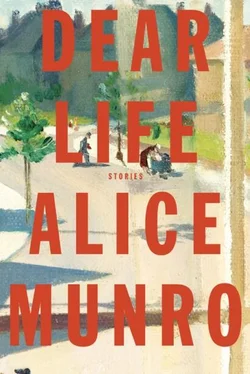I was too old for such fooling, certainly too old by this time. My sister was nine when I was fourteen. The relationship between us was always unsettled. When I wasn’t tormenting her, teasing her in some asinine way, I would take on the role of sophisticated counsellor or hair-raising storyteller. I would dress her up in some of the old clothes that had been put away in my mother’s hope chest, being too fine to be cut up for quilts and too out of date for anybody to wear. I would put my mother’s old caked rouge and powder on her face and tell her how pretty she looked. She was pretty, without a doubt, though the face I put on her gave her the look of a freakish foreign doll.
I don’t mean to say that I was entirely in control of her, or even that our lives were constantly intertwined. She had her own friends, her own games. These tended towards domesticity rather than glamour. Dolls were taken for walks in their baby carriages, or sometimes kittens were dressed up and walked in the dolls’ stead, always frantic to get out. Also there were play sessions when somebody got to be the teacher and could slap the others over the wrists and make them pretend to cry, for various infractions and stupidities.
In the month of June, as I have said, I was free of school and left on my own, as I don’t remember being in quite the same way in any other time of my growing-up. I did some chores in the house, but my mother must have been well enough, as yet, to handle most of that work. Or perhaps we had just enough money at the time to hire what she—my mother—would call a maid, though everybody else said hired girl. I don’t remember, at any rate, having to tackle any of the jobs that piled up for me in later summers, when I fought quite willingly to maintain the decency of our house. It seems that the mysterious turkey egg must have given me some invalid status, so that I could spend part of the time wandering about like a visitor.
Though not trailing any special clouds. Nobody in our family would have got away with that. It was all inward—this uselessness and strangeness I felt. And not continual uselessness either. I remember squatting down to thin the baby carrots as you had to do every spring, so the root would grow to a decent size to be eaten.
It must have been just that every moment of the day was not filled up with jobs, as it was in summers before and after.
So maybe that was the reason that I had begun to have trouble getting to sleep. At first, I think, that meant lying awake maybe till around midnight and wondering at how wide awake I was, with the rest of the household asleep. I would have read, and got tired in the usual way, and turned out my light and waited. Nobody would have called out to me earlier, telling me to put out my light and get to sleep. For the first time ever (and this too must have marked a special status) I was left to make up my own mind about such a thing.
It took a while for the house to change from the light of day and from the household lights turned on late into the evening. Leaving behind the general clatter of things to be done, hung up, finished with, it became a stranger place in which people and the work that dictated their lives fell away, their uses for everything around them fell away, all the furniture retreated into itself and no longer existed because of anybody’s attention.
You might think this was a liberation. At first, perhaps it was. The freedom. The strangeness. But as my failure to fall asleep prolonged itself, and as it finally took hold altogether until it changed into the dawn, I became more and more disturbed by it. I started saying rhymes, then real poetry, first to make myself go under but then hardly of my own volition. The activity seemed to mock me. I was mocking myself, as the words turned into absurdity, into the silliest random speech.
I was not myself.
I had been hearing that said of people now and then, all my life, without thinking what it could mean.
So who do you think you are, then?
I’d been hearing that too, without attaching to it any real menace, just taking it as a sort of routine jeering.
Think again.
By this time it wasn’t sleep I was after. I knew mere sleep wasn’t likely. Maybe not even desirable. Something was taking hold of me and it was my business, my hope, to fight it off. I had the sense to do that, but only barely, as it seemed. Whatever it was was trying to tell me to do things, not exactly for any reason but just to see if such acts were possible. It was informing me that motives were not necessary.
It was only necessary to give in. How strange. Not out of revenge, or for any normal reason, but just because you had thought of something.
And I did think of it. The more I chased the thought away, the more it came back. No vengeance, no hatred—as I’ve said, no reason, except that something like an utterly cold deep thought that was hardly an urging, more of a contemplation, could take possession of me. I must not even think of it but I did think of it.
The thought was there and hanging in my mind.
The thought that I could strangle my little sister, who was asleep in the bunk below me and whom I loved more than anybody in the world.
I might do it not for any jealousy, viciousness, or anger, but because of madness, which could be lying right beside me there in the night. Not a savage madness either, but something that could be almost teasing. A lazy, teasing, half-sluggish suggestion that seemed to have been waiting a long time.
It might be saying why not. Why not try the worst?
The worst. Here in the most familiar place, the room where we had lain for all of our lives and thought ourselves most safe. I might do it for no reason I or anybody could understand, except that I could not help it.
The thing to do was to get up, to get myself out of that room and out of the house. I went down the rungs of the ladder and never cast a single look at my sister where she slept. Then quietly down the stairs, nobody stirring, into the kitchen where everything was so familiar to me that I could make my way without a light. The kitchen door was not really locked—I am not even sure that we possessed a key. A chair was pushed under the doorknob so that anybody trying to get in would make a great clatter. A slow careful removal of the chair could be managed without making any noise at all.
After the first night I was able to make my moves without a break, so that I could be outside, as it seemed, within a couple of smooth seconds.
Of course there were no streetlights—we were too far from town.
Everything was larger. The trees around the house were always called by their names—the beech tree, the elm tree, the oak tree, the maples always spoken of in the plural and not differentiated, because they clung together. Now they were all intensely black. So were the white lilac tree (no longer with its blooms) and the purple lilac tree—always called lilac trees not bushes because they had grown too big.
The front and back and side lawns were easy to negotiate because I had mown them myself with the idea of giving us some townlike respectability.
The east side of our house and the west side looked on two different worlds, or so it seemed to me. The east side was the town side, even though you could not see any town. Not so much as two miles away, there were houses in rows, with streetlights and running water. And though I have said you could not see any of that, I am really not sure that you couldn’t get a certain glow if you stared long enough.
To the west, the long curve of the river and the fields and the trees and the sunsets had nothing to interrupt them. Nothing to do with people, in my mind, or to do with ordinary life, ever.
Back and forth I walked, first close to the house and then venturing here and there as I got to rely on my eyesight and could count on not bumping into the pump handle or the platform that supported the clothesline. The birds began to stir, and then to sing—as if each of them had thought of it separately, up there in the trees. They woke far earlier than I would have thought possible. But soon after those earliest starting songs, there got to be a little whitening in the sky. And suddenly I would be overwhelmed with sleepiness. I went back into the house, where there was suddenly darkness everywhere, and I very properly, carefully, silently, set the tilted chair under the doorknob, and went upstairs without a sound, managing doors and steps with the caution necessary, although I seemed already half asleep. I fell into my pillow, and I woke late—late in our house being around eight o’clock.
Читать дальше












